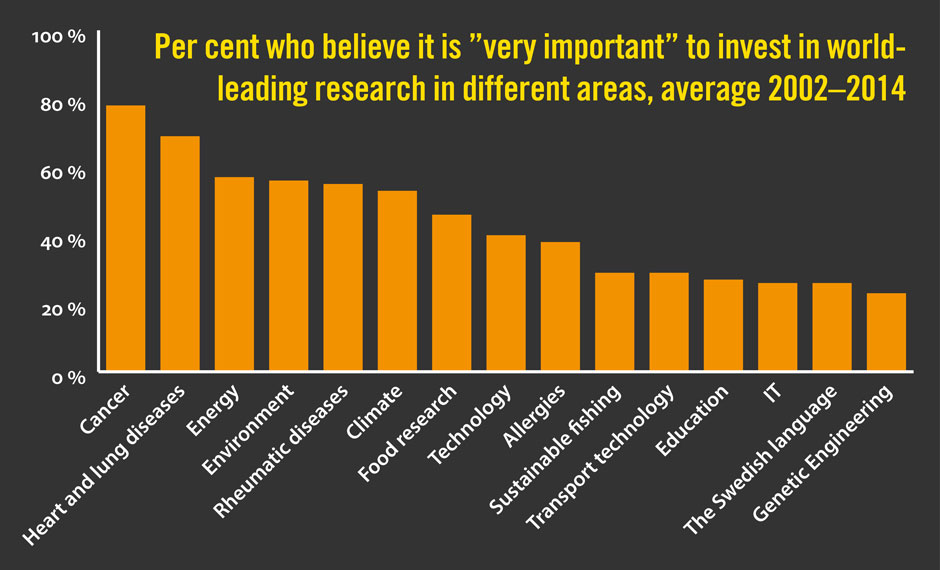Press release 150701
Most Swedes have a high confidence in scientists. There is also widespread agreement that investment in research leads to a better society for all, according to a new report published by VA (Public & Science) and the SOM Institute at the University of Gothenburg.

Since 2002, the non-profit Swedish organisation VA (Public & Science), in collaboration with the SOM Institute at the University of Gothenburg, has been conducting annual surveys to measure the Swedish public’s views on science and research. In the latest survey, 62 percent of Swedes say that they have high or fairly high confidence in how scientists do their jobs. This is significantly higher than for Swedish politicians and journalists, for example, who are at 32 and 29 percent respectively. Public confidence is highest for nurses and the police (89 and 65 percent, respectively).
“Many factors affect people’s confidence. We see, for example, that young people, those who are highly educated and people living in big cities have the highest confidence in both research and scientists. Even how politically engaged someone is and, particularly, interpersonal trust seem to affect confidence in a positive way”, said Henrik Oscarsson, Professor of Political Science and Research Director of the SOM Institute.
Although there has been a slight rise in confidence in research across all faculty areas, there are, as in previous years, large differences between academic fields. Medicine is at the top; 74 percent say they have very or fairly high confidence in medical research conducted in Sweden. This is followed by Engineering (64 percent), Natural Sciences (59) and Social Sciences (47). Bottom of the list are Educational Sciences (39 percent) and the Humanities (38).
“This opens up interesting avenues for future studies. What are the reasons behind why medicine is always at the top of the list and educational sciences and the humanities end up a lot further down? We are now developing a new substudy, in which we will take a closer look at how different factors affect public confidence”, said Maria Lindholm, Director of Research at VA.
Each year, the survey also asks the public how important is it that Sweden invests public money on world-leading research in a number of areas. When you consider average figures since the survey began in 2002, there are six areas that the majority of Swedes think are very important for Sweden to invest in. Top of the list is Cancer (78 percent), followed by Heart and Lung Diseases (69), Energy (57), Environment (56), Rheumatic Diseases (55) and Climate (53). All of them fall within the natural sciences or medicine.
The majority of Swedes agree with the statement “it is important that scientists engage in dialogue with society.” On a scale from 1 = totally wrong to 7 = completely right, the average in the survey is 6.20. Almost as strong is the belief that “it is important for scientists to collaborate with business and industry” (6.05) and that “increased investment in research results in a better society for all” (6.01). There is a little more uncertainty over whether “scientists that collaborate with others outside of universities should be given priority when money for research is allocated” (5.15). This may be because respondents find it difficult to have an opinion on the issue as the question is relatively specific and many people are not familiar with the procedures and processes relating to the allocation of funding.
“Dialogue between scientists and society is increasingly considered crucial in many different contexts, not least at European level, if research is going to tackle the major societal challenges. It is both interesting and encouraging to see that we, the Swedes, are of the same opinion”, said Maria Lindholm.
This year’s report is based on results of the 2014 survey and is written by Annika Bergström, the researcher in charge of the survey, and Henrik Oscarsson, Research Director of the SOM Institute. The survey is part of the project Science in Society, a collaboration between VA and the SOM Institute, supported by Riksbankens Jubileumsfond – The Swedish Foundation for Humanities and the Social Sciences, University of Gothenburg, Lund University and Uppsala University.
Further information, high-resolution images and the report Science in Society – Results of SOM survey 2014 (Swedish only) can be found at www.v-a.se or contact:
Maria Lindholm, Director of Research at VA (Public & Science) [email protected], tel +46 (0)70-867 66 77
Henrik Oscarsson, Research Director of the SOM Institute, University of Gothenburg, [email protected]
VA (Public and Science) promotes dialogue and openness between researchers and the public – especially young people. The organisation works to create new forms of dialogue about research. VA is also developing new knowledge on the relationship between research and society through surveys and studies. Its members consist of some 80 organisations, authorities, companies and associations. In addition, it has a number of individual members. For more information visit www.v-a.se/in-english/

